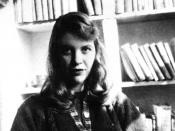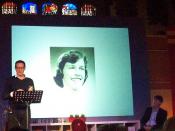"Mad Girl's Love Song"ÃÂ Critical Analysis The poem, "Mad Girl's Love Song"ÃÂ, was written by Sylvia Plath. This poem has a theme of suicide as an escape. The author, Sylvia Plath, is writing this song from her own personal view. There are many places where the theme of suicide appears in the poem.
The first stanza of the poem contains three lines that are repeated throughout the poem. This stanza is the building block for the rest of the poem. These lines are implying that Sylvia feels that she is able to control life and death. "I shut my eyes . . . "ÃÂ, represents being afraid and/or tired of something. She is tired of fight with the world and is afraid of what is happening to her at this point in her life. So, as an escape from the reality of the world she closes her eyes.
Sylvia is saying that just simply closing her eyes or hiding does not last forever because when she opens her eyes everything is still the same. "(I think I made you up inside my head)"ÃÂ, with this, Sylvia is referring to the happiness and normality of her own life. She feels that this has never been a real part of her life and therefore she has only made it up in her head.
In the second stanza, Sylvia is saying that her life was abruptly taken over by and "arbitrary blackness"ÃÂ. This blackness she is referring to is depression. Following this line is the repeated line, "I shut my eyes and all the world drops dead"ÃÂ. This is showing that Sylvia is trying to escape from her overwhelming depression.
The next section of the poem talks about Sylvia's life and how she wished it had been.
" I dreamed you bewitched me into bed, and sung me moon-stuck, kissed me quite insane."ÃÂ Here Sylvia is wishing her life could have resembled something of a normal life. Falling in love and being kissed are both normal things people are supposed to experience and embellish in, but due to her condition she was never able to achieve this state. "(I think I made you up inside my head)"ÃÂ Since Sylvia was ultimately unsuccessful at living a satisfying life she felt that this was something she had only dreamed of. She had dreamed of this for so long that she made herself believe it was something she could achieve, when really she could not.
In the next stanza of the poem Sylvia explains how she has no influences in her life, especially in the way of religion. "God topples from the sky, hell's fire fade:"ÃÂ God and Satan have no meaning in her life. "Exit Seraphim and Satan's men:"ÃÂ These beliefs, good or bad, have left her life. She has been left alone to decide her fate. Sylvia is pointing out that she has nothing to life for and even worse nothing to gain from ending her own life. "I shut my eyes and all the world drops dead."ÃÂ This line represents suicide. This is saying that she is not wanting to die to be with God or to be in Hell.
Sylvia wished that she would eventually overcome her depression and grow out of the despair she was living in. "I fancied you'd return the way you said, but I grow old and I forget your name."ÃÂ But in fact, her longing and search for her happiness had driven her insane. She had been lost for so long that she didn't remember what it was like to truly be happy so therefore she would never be able to identify it if she were to regain control of her life. Once again the line, "(I think I made you up inside my head)"ÃÂ is referring to the state of insanity that Sylvia Plath had driven herself into.
Finally, in the last section of the poem, Sylvia states "I should have loved a thunderbird instead, at least when spring comes they roar back again."ÃÂ With this statement she is blaming herself for wanting and in the end actually having a love for something that was impossible for her to obtain. She feels that she should have been like the rest of the world and chose something materialistic to long for such as a thunderbird sports car. In this case, people put these cars away for the winter but she would have the reassurance that her happiness, her love would always be there to come back to her. The two repetitious lines are seen here to end the poem. "I shut my eyes and all the world drops dead, (I think I made you up inside my head)"ÃÂ This time these lines are seen in the same stanza when before the line containing death was seen after an idea of despair and the line about imagination was seen in the stanzas that dealt with how her life should have been. The line, "(I think I made you up inside my head)"ÃÂ, is written in parentheses, so therefore is something Sylvia is just realizing herself but does not want believe it as being true. So, in combining these two lines, Sylvia is making a bold statement that in committing suicide she would be able to escape the reality of never being able to find true happiness in living. The title "Mad Girl's Love Song"ÃÂ, when looked after analyzing the poem, is quite clear. It is saying that the love for her happiness drove her to insanity.





